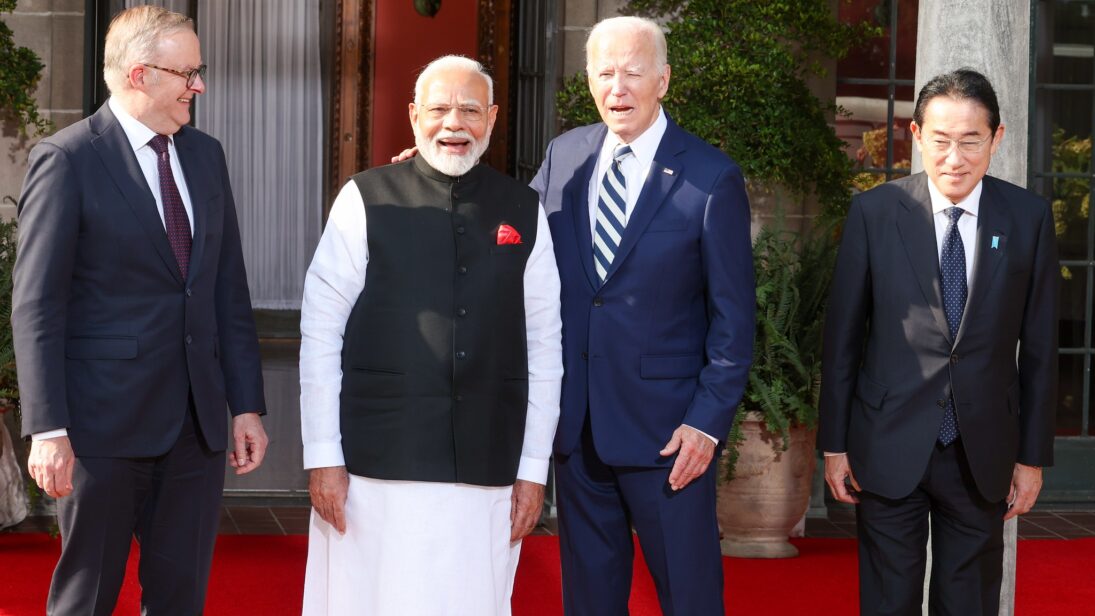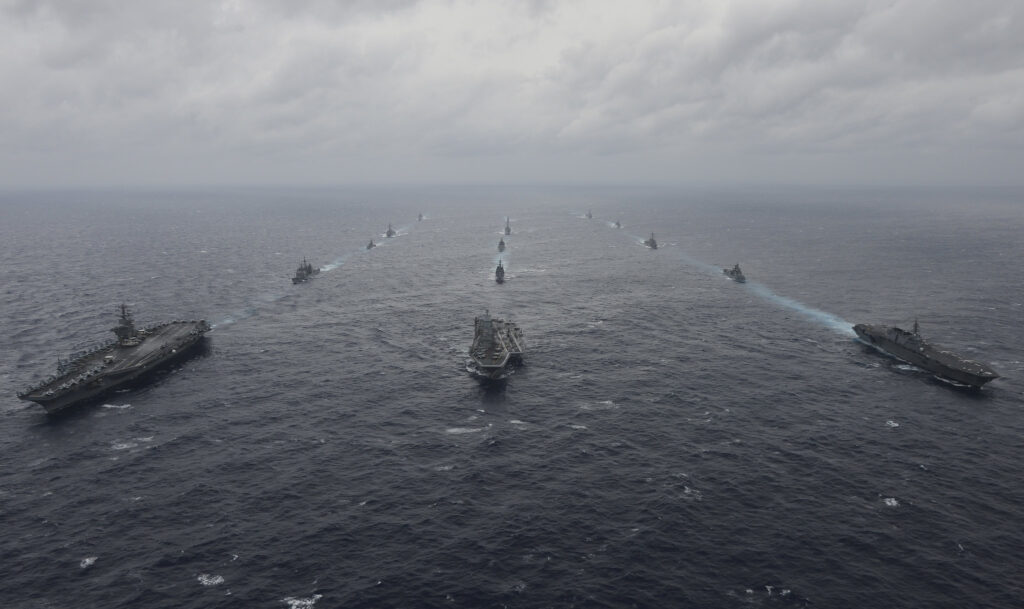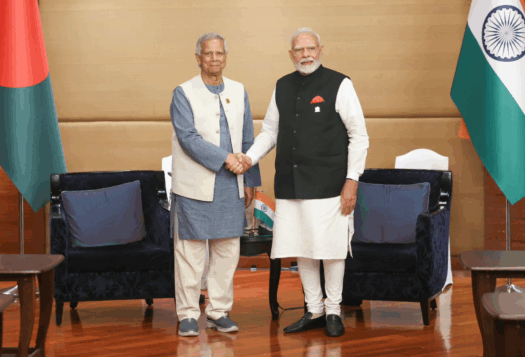
Exercise Malabar is underway in the Bay of Bengal, hosted by India. The navies of the four Quad nations – Australia, India, Japan, and the United States – coming together for a multilateral exercise aiming to enhance interoperability and preparedness to address shared maritime challenges in the Indo-Pacific is a significant strategic signal in itself.
What started as a bilateral exercise between the navies of India and the United States in 1992 has steadily expanded in complexity and scale, seeing the continued participation of Japan (since 2015) and Australia (since 2020) with a clear focus on enhancing operational capabilities. Recent editions have been held off the coasts of Sydney and Yokosuka, highlighting the importance of Exercise Malabar in the strategic calculus of the four nations.
The exercises have a harbor and sea phase, which cover complex maritime operations such as anti-submarine warfare, surface warfare, and air defense exercises conducted at sea. The emphasis is on improving situational awareness in the maritime domain.
While not to be conflated with the Quad, naval strategists like former Indian Chief of the Naval Staff Admiral Karambir Singh, do think that Malabar has become a subset of what cooperation within the Quad tries to achieve: incremental building of trust among partners and scaling up the complexity of exercises to improve interoperability in operational scenarios.
If the goal is to deter Chinese adventurism, limit countervailing influence, and shape the environment in favor of a free and open seas, then building collective maritime competence in the region is what the four nations are aiming for. Malabar is a step toward that goal.
A Sum of Many Moving Parts
The Quad may not have an explicit security mandate – practitioners would argue that it’s not its public mandate to have one – but to dismiss the incremental build-up of security cooperation within the Quad as just political signaling would be disingenuous. On the contrary, the four nations of the Quad are quietly and effectively pursuing habits of cooperation – lines of effort aimed to build resilience through deterrence in niche capacities, which are seemingly non-threatening but effective in case of escalation.
If the goal is to deter Chinese adventurism, limit countervailing influence, and shape the environment in favor of a free and open seas, then building collective maritime competence in the region is what the four nations are aiming for. Malabar is a step toward that goal.
First, one could argue that the Quad’s emphasis on joint training programs and capacity-building initiatives reflects the overlap of growing bilateral partnerships and agendas of the separate “2+2” foreign and security dialogues within the four nations, all focusing on enhancing interoperability and readiness. The heavy lifting of building trust, coming to a shared understanding of mutual concerns, and enhancing capacities via joint exercises, exchanges of personnel, training, and intelligence sharing are already in place. Bilateral and trilateral cooperation, initiatives like the India-U.S. Defense Acceleration Ecosystem (INDUS-X), initiative on Critical and Emerging Technology (iCET), logistical agreements, refueling arrangements, and expanded joint military exercises have helped in aligning and synergizing ecosystems.
For instance, apart from sending strategic signals on the unity of intent and purpose, the Malabar exercises today build capacities in areas that are fundamental to what maritime security cooperation in the Quad is trying to secure. That includes enhanced interoperability, advanced tactical training, strengthened maritime domain awareness, joint operational planning to foster a deeper understanding of each nation’s naval doctrines and operational procedures, capacity building both by skilling and integration of technology, and greater coordination in humanitarian assistance and disaster relief (HA/DR) operations. A case in point is the joint Quad effort to deliver assistance to landslide-hit Papua New Guinea in May 2024.
Counterterrorism agendas overlap too. The Quad’s Working Group on Counterterrorism held its first meeting and fourth tabletop exercise in Honolulu in December 2023. These exercises focused on improving collaborative strategies and responses to evolving terrorist threats, such as the use of unmanned aerial vehicles (UAVs) and cyber tools. The exchange across platforms is bolstering closer cooperation.
Resilience Against Maritime Incursions
The Quad Foreign Ministers’ Meeting in Tokyo in July and the Leaders’ Summit in Wilmington in September shared threat assessments and efforts to build collective deterrence in fairly transparent terms. The Quad leaders’ joint statement, for instance, “strongly” opposed “any destabilizing or unilateral actions that seek to change the status quo by force or coercion.”
Two outcomes were specifically linked to addressing gray-zone tactics and removing maritime blind spots. The expansion of the Indo-Pacific Maritime Awareness Initiative at a time of increasing Chinese belligerence in the South China Sea (SCS) and forays to establish a permanent presence in the Indian Ocean region are welcome steps. Integrating more advanced satellite systems and maritime surveillance technologies to improve real-time monitoring of threats and coordination in response to illegal fishing and gray-zone activities are concrete deliverables involving practical cooperation. The Quad’s coast guard initiative, as the next logical step to enhance resilience on the high seas, has the scope to expand and build on existing linkages.

The announcement of a forthcoming maritime legal dialogue – which will share expertise on international law of the sea issues “to support efforts to uphold the rules-based maritime order in the Indo-Pacific”– is an important demonstration of listening to the needs of vulnerable partners. At a time when China is pushing for an early conclusion of the Code of Conduct negotiations in the South China Sea even while attempting to change the status quo and create a new normal in disputed waters, equipping partners with greater awareness of their positions under the United Nations Conventions on the Law of the Sea (UNCLOS) is key. In addition, the initiative will also enhance operational integration by ensuring that naval forces operate under a common legal framework.
Returning to the topic of Exercise Malabar, this year’s focus on advanced antisubmarine warfare highlights the Quad navies’ concern about China’s growing underwater capabilities. India, the United States, and Australia are enhancing coordination of their reconnaissance capabilities with the deployment of key assets in the exercises.
India’s signing of a Security of Supply Arrangement (SOSA) with the United States has facilitated its acquisition of 500 advanced sonobuoys from Washington, to improve its antisubmarine warfare capabilities. The United States, United Kingdom, and Australia already have a P-8 sonobuoy data-sharing agreement under AUKUS, so India’s acquisition of the same technology further helps improve operational interoperability.
The Quad is also addressing fears of the potential control and manipulation of sensitive data and commercial blockades by pooling resources to upgrade undersea cable resilience and improving interoperability in cybersecurity. Overall, the Quad’s holistic approach to building resilience through deterrence is fairly obvious.
Building Resilience to Deter
The axiom that “the whole is greater than the sum of the parts” best describes the current trajectory of the Quad, which is trying to remain nimble and flexible to the needs of the region and prove that the security and development agenda can go hand in hand.
Those arguing for a harder edge to the Quad are right in forecasting that the future may bring harder choices for managing escalating conflict in the region. But it would also be naive to dismiss the Quad’s existing relevance in coordinating harder security cooperation, given that the political conversation behind closed doors has never been more aligned, according to insiders.
The axiom that “the whole is greater than the sum of the parts” best describes the current trajectory of the Quad, which is trying to remain nimble and flexible to the needs of the region and prove that the security and development agenda can go hand in hand.
There is perhaps no bigger indicator of the relevance of the grouping and the incremental choices that it is making to build collective security than the investment by New Delhi. India has evolved from being called the weakest link of the grouping to mainstreaming the Quad and being described as a pacesetter by partners like the United States. India is no longer content with being in the room; it is actively shaping the agenda.
India’s ownership of the grouping as its most important platform for delivering cooperation in the Indo-Pacific, especially on maritime security and maintenance of the global commons, is now a common reference in its articulation for its vision. The Malabar exercises are key to India’s growing contribution to regional resilience.
Quiet reassurance from the Quad will find more traction in the complex and disruptive geopolitical environment of the day. The focus should be to sustain the momentum.
Editor’s Note: A version of this piece originally appeared on The Diplomat and has been republished with permission from the author and the editors.
Also Read: The Quad Must Tackle Nuclear Threats in the Indo-Pacific
***
Image 1: MEAphotogallery via Flickr
Image 2: U.S. Navy photo by Mass Communication Specialist 3rd Class Cole Schroeder via Flickr


